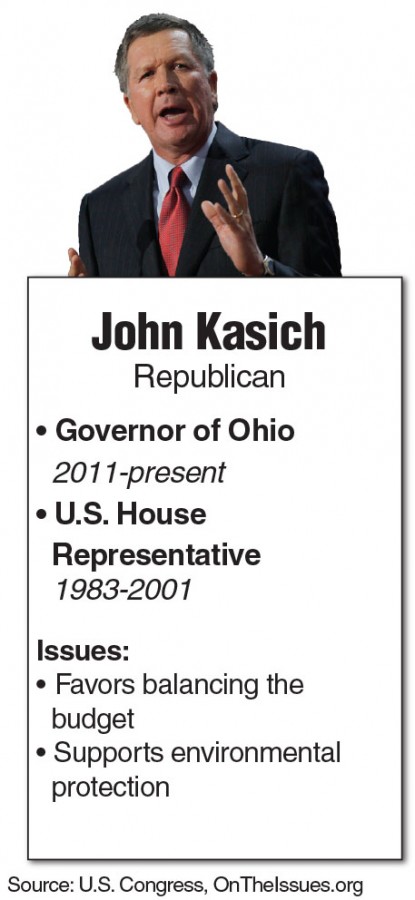Democrats fear Bush or Kasich the most as 2016 opponent
Bio box of presidential candidate John Kasich. Tribune News Service 2015
August 30, 2015
MINNEAPOLIS _ The Republican that Democrats fear most isn’t Donald Trump. It’s Jeb Bush, with John Kasich coming on fast.
Ask members of the Democratic National Committee whom they least want to face in the 2016 presidential election, and they often joke how they hope Trump stays hot.
“We are all Trump supporters,” Glen Maxey, a DNC member from Texas, said with a laugh. The DNC ended its three-day summer meeting Saturday, and members see Trump’s high negatives and penchant for controversy as lethal in a general election.
The insiders most respect those who have succeeded politically, and Trump has never won public office. That’s why Democrats often name as their most difficult foes Bush, a former governor of Florida and part of a family that’s won three presidential elections, and Kasich, second-term governor of a key swing state, Ohio.
“Bush has experience, and he’s shown he can govern,” said Alice Huffman, a DNC member from Sacramento.
Bush won two elections in Florida, one of the country’s most unpredictable political environments, and so far this election cycle, he and his supporters have collected far more campaign money than anyone else.
“Money talks loudly in politics,” said Nancy Worley, the Alabama Democratic chairwoman. “And Bush has the power structure to keep raising money.”
Bush is also seen as having positions that appeal to the centrist swing voters who often decide elections. On immigration, for example, he supports a path to legal status for many undocumented immigrants.
“He’s trying to play the adult in the room,” said Mitchell Ceasar, a DNC member from Florida.
Bush’s style could be welcomed as a contrast to the acerbic Trump, Maxey said.
What gives him and others some pause is that “Bush is very rusty,” Ceasar said, since he last ran for office 13 years ago.
Enter Kasich.
He’s still getting known, but has a natural appeal to the pros. He won the governorship of Ohio in 2010, defeating Gov. Ted Strickland, an ally of President Barack Obama. Four years later, Kasich won re-election in a landslide.
Many Democrats remember him as a congressman, when he worked with them on budget and national security issues. Today, his views are seen as center-right, and his ease with voters is considered a big plus.
Kasich was one of the last to enter the presidential race, declaring his candidacy only about a month ago, and has been rising steadily in polls.
Dottie Deans, Vermont Democratic chairwoman, said she found herself focusing on him during the Republicans’ Aug. 6 debate.
“He just kind of bubbled up,” she said.
Belinda Biafore, the West Virginia Democratic chairwoman, had the same sense. “The things he said were not clearly leaning to the right,” she said.
Democrats also cited Scott Walker, the governor of Wisconsin, and Sen. Marco Rubio of Florida as Republicans who could give them trouble.
Walker has stumbled recently. After Trump declared he wanted to end “birthright citizenship,” which allows children born to undocumented immigrants in this country to become citizens, Walker agreed. A few days later, he said he did not support amending the Constitution to make the change.
Rubio seems lost so far in the Republican crowd, unable to get much notice, though polls suggest he has potential.
A Quinnipiac University last week showed that Hillary Clinton, the Democratic front-runner, beating Rubio in a hypothetical matchup by a percentage point and Bush by 2. Vice President Joe Biden, who is considering running, topped Rubio by 3 and Bush by 6.
The poll illustrated why Democrats are eager for Trump to keep doing well.
What gives Democrats hope is that should Bush, Kasich or one of the other tougher candidates become the nominee, they’ll have to veer too far to the right to remain strong general election candidates.
That may already be happening; Bush is under fire for referring to
“anchor babies” to describe children born to noncitizens. Critics say the baby makes it easier for other family members, who may not be citizens, to settle in the U.S.
“The toughest Republican to run against in 2012 would have been Mitt Romney, the moderate to liberal governor of Massachusetts,” said James Zogby, an at-large DNC member. “By the time he emerged from the primary process, he wasn’t the same.”
Romney positioned himself as a diehard conservative, won the nomination, and lost the election.






















































